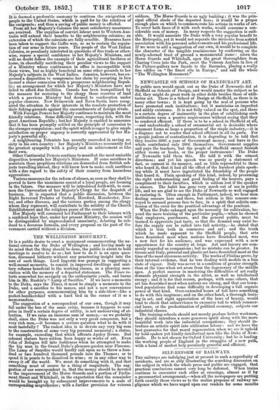THE WELLINGTON MONUMENT.
Ix is a public desire to erect a monument commemorating the na- tional esteem for the Duke of Wellington ; and having made up its mind that the thing should be done, the public is about to hold meetings to resolve to do so ; but how to do it is an open ques- tion, discussed hitherto without any penetrating insight into the core of such things. Lord Ingestre was prompt in suggesting a well-meant memento, to consist in improved dwellings and sani- tary reforms beneficial to the workino.e' classes, as a pleasing asso- ciation with the memory of a departed statesman. The Times re- torts somewhat too savagely on the enthusiastic youth, and burns him in Mr. Ruskin's " Lamp of Sacrifice." If we have a memento to the Duke, says the Times, it must be simply a memento to the Duke, and a sacrifice to his manes, and not a new convenience
for other purposes, commemorating him by a side-blow—like a pocket-handkerchief with a knot tied in the corner of it as a memorandum.
The suggestion of a correspondent of our own, though it may fall under the ban of the same critic, because it happens to com- prise in itself a certain degree of utility, is not undeserving of at- tention. If we raise an immense sum of money,—as we probably shall, since. the Duke was not only a very great conqueror, but a very rich man,—it becomes a serious question what to do with it most tastefully ? The rudest idea is to devote any very big sum to the construction of some very big personal memorial ; a statue, for example, exceeding that which affronts A psley House. But colossal statues have seldom been happy as works of art. Even John of Bologna fell into feebleness when he attempted to make the big man in the Grand Duke's pleasure-garden near Florence. The Lamp of -Sanrifice would hardly call upon us to throw a hun- dred or two hundred thousand pounds into the, Thames; er to spend it in pearls to be dissolved in wine; or in any other way to sweep it off the world.- We must do something with it, and that something must of course be a thing of magnitude. The sug- gestion of our correspondent is, that the money should be devoted to the improvement of the Horse Guards and a portion of Parlia- ment Street and Whitehall, in the expectation that the remainder would be brought up by subsequent improvements to a scale of corresponding magnificence; with a further provision for veteran soldiers. The Horse Guards is an ugly building ; it was the prin- cipal official abode of the departed hero; it would be a proper enough place on which to commemorate his actions in works of art. To cover both faces of it with such works, would consume 'a con- siderable sum of money. In many respects the suggestion is suit- able. It would associate the Duke with a very popular benefit to the Metropolis, yet it would not separate the memento from astriet, association with his personal achievements and his professional life. If we were to add a suggestion of our own, it would be to complete the character of the tangible reminiscence by conferring on the newly-adorned tract of ground a monumental name : adorn the Horse Guards and Whitehall, open the great thoroughfare from Charing Cross into the Park, erect the Veteran Asylum in lien of the Picture-gallery now facade to the Barracks, placing a really fine edifice on "the finest site in Europe," and call the whole " The Wellington Monument."


























 Previous page
Previous page